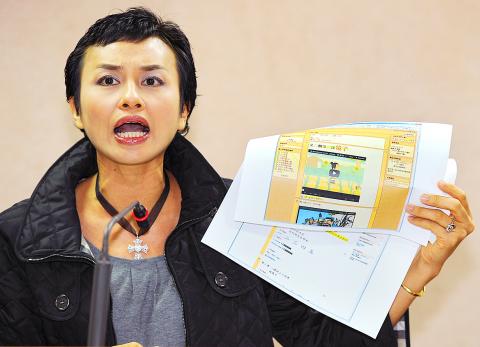Overseas Chinese Affairs Council (OCAC) Minister Wu Ying-yih (吳英毅) came under fire from the Democratic Progressive Party (DPP) again yesterday over the council’s promotion of simplified Chinese characters.
In September, DPP Legislator Hsiao Bi-khim (蕭美琴) said that the name of the agency had been changed without prior notice from “Overseas Compatriots Affairs Commission” — a reversal of a former DPP administration’s decision in 2006 that opted for the politically neutral “compatriots” so as to unite Taiwanese expatriates divided by issues of national identity.
At a Foreign Affairs and National Defense meeting in the legislature yesterday, which was scheduled to review the council’s budget statement for next year, DPP Legislator Chiu Yi-ying (邱議瑩) criticized the council for creating online resources to learn simplified Chinese characters.

Photo: Liao Chen-hui, Taipei Times
Over the past four years, the council spent an average of NT$6 million (US$207,000) each year on the Web site, E-learning Huayu in Taiwan, even though the learning resources available for download are in simplified Chinese, Chiu said.
“Could it be that the OCAC is working to help China promote simplified characters?” she asked.
Hsiao questioned whether Wu valued simplified Chinese characters more than traditional Chinese characters and Taiwanese culture.
“China sets up Confucius Institutes around the world to teach simplified Chinese characters. Don’t bother helping China promote simplified Chinese characters,” Hsiao said.
Wu said that the simplified Chinese characters available on the Web site were uploaded by Chinese-language teachers in the private sector and were not provided by the council.
“Actually we juxtapose learning resources in traditional and simplified characters on the Web site. The learning resources in simplified Chinese characters help people who know simplified Chinese characters to learn traditional Chinese characters,” Wu said.
Chinese Nationalist Party (KMT) Legislator Chan Kai-chen (詹凱臣) also found it “inappropriate” that a government-administered Web site provided Chinese-language learning resources in simplified characters, despite the “good intention.”
When pressed on the issue, Wu agreed to remove the characters.
Regarding the agency’s name change — a decision which has been decried by expatriates, Wu said that the council recognized the situation.
“We noticed that about 120 overseas compatriot communities have systematically voiced their opposition [to the name change]. But overall, the number of overseas compatriot communities that we have contact with amounts to 4,000 or 5,000,” he said.
Hsiao responded by saying: “You said 4,000 or 5,000? Many of the compatriots have never resided in Taiwan. They never pay taxes in Taiwan. They were not born in Taiwan.”
A total of NT$1.3 billion was earmarked for the council’s budget for next year.
Wu called on legislators not to cut the budget as he said that under the current budget for next year, the council could spend only NT$480 on each expatriate, if the population of expatriates includes all those people who have moved from Taiwan.
The council has a broader definition of the expatriate population — ethnic Chinese who live in an overseas country and identify with the Republic of China (ROC).
In related developments, Wu said he agreed to renaming the agency to ROC (Taiwan) Overseas Community Affairs Council after opposition legislators threatened to freeze its budget. Wu said he would ask the Executive Yuan to approve the change.

A preclearance service to facilitate entry for people traveling to select airports in Japan would be available from Thursday next week to Feb. 25 at Taiwan Taoyuan International Airport, Taoyuan International Airport Corp (TIAC) said on Tuesday. The service was first made available to Taiwanese travelers throughout the winter vacation of 2024 and during the Lunar New Year holiday. In addition to flights to the Japanese cities of Hakodate, Asahikawa, Akita, Sendai, Niigata, Okayama, Takamatsu, Kumamoto and Kagoshima, the service would be available to travelers to Kobe and Oita. The service can be accessed by passengers of 15 flight routes operated by

Alain Robert, known as the "French Spider-Man," praised Alex Honnold as exceptionally well-prepared after the US climber completed a free solo ascent of Taipei 101 yesterday. Robert said Honnold's ascent of the 508m-tall skyscraper in just more than one-and-a-half hours without using safety ropes or equipment was a remarkable achievement. "This is my life," he said in an interview conducted in French, adding that he liked the feeling of being "on the edge of danger." The 63-year-old Frenchman climbed Taipei 101 using ropes in December 2004, taking about four hours to reach the top. On a one-to-10 scale of difficulty, Robert said Taipei 101

MORE FALL: An investigation into one of Xi’s key cronies, part of a broader ‘anti-corruption’ drive, indicates that he might have a deep distrust in the military, an expert said China’s latest military purge underscores systemic risks in its shift from collective leadership to sole rule under Chinese President Xi Jinping (習近平), and could disrupt its chain of command and military capabilities, a national security official said yesterday. If decisionmaking within the Chinese Communist Party has become “irrational” under one-man rule, the Taiwan Strait and the regional situation must be approached with extreme caution, given unforeseen risks, they added. The anonymous official made the remarks as China’s Central Military Commission Vice Chairman Zhang Youxia (張又俠) and Joint Staff Department Chief of Staff Liu Zhenli (劉振立) were reportedly being investigated for suspected “serious

Taiwanese and US defense groups are collaborating to introduce deployable, semi-autonomous manufacturing systems for drones and components in a boost to the nation’s supply chain resilience. Taiwan’s G-Tech Optroelectronics Corp subsidiary GTOC and the US’ Aerkomm Inc on Friday announced an agreement with fellow US-based Firestorm Lab to adopt the latter’s xCell, a technology featuring 3D printers fitted in 6.1m container units. The systems enable aerial platforms and parts to be produced in high volumes from dispersed nodes capable of rapid redeployment, to minimize the risk of enemy strikes and to meet field requirements, they said. Firestorm chief technology officer Ian Muceus said